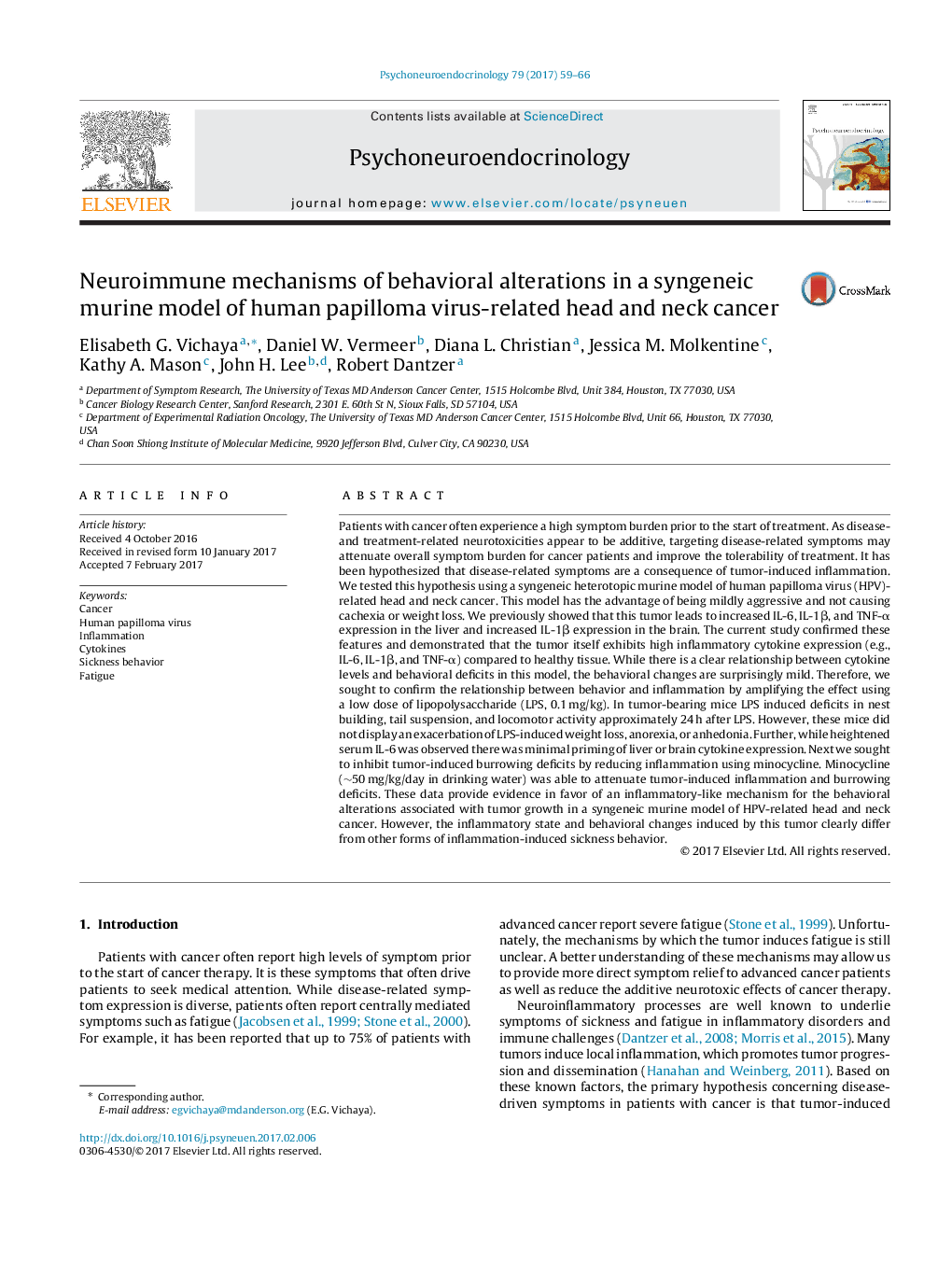| کد مقاله | کد نشریه | سال انتشار | مقاله انگلیسی | نسخه تمام متن |
|---|---|---|---|---|
| 4934529 | 1433964 | 2017 | 8 صفحه PDF | دانلود رایگان |
عنوان انگلیسی مقاله ISI
Neuroimmune mechanisms of behavioral alterations in a syngeneic murine model of human papilloma virus-related head and neck cancer
ترجمه فارسی عنوان
مکانیزم های نوروژنیک تغییرات رفتاری در یک مدل موی سینژنتیک سرطان سر و گردن مرتبط با ویروس پاپیلومای انسانی
دانلود مقاله + سفارش ترجمه
دانلود مقاله ISI انگلیسی
رایگان برای ایرانیان
کلمات کلیدی
سرطان، ویروس پاپیلومای انسانی، التهاب سیتوکین ها، رفتار بیمار، خستگی،
موضوعات مرتبط
علوم زیستی و بیوفناوری
بیوشیمی، ژنتیک و زیست شناسی مولکولی
علوم غدد
چکیده انگلیسی
Patients with cancer often experience a high symptom burden prior to the start of treatment. As disease- and treatment-related neurotoxicities appear to be additive, targeting disease-related symptoms may attenuate overall symptom burden for cancer patients and improve the tolerability of treatment. It has been hypothesized that disease-related symptoms are a consequence of tumor-induced inflammation. We tested this hypothesis using a syngeneic heterotopic murine model of human papilloma virus (HPV)-related head and neck cancer. This model has the advantage of being mildly aggressive and not causing cachexia or weight loss. We previously showed that this tumor leads to increased IL-6, IL-1β, and TNF-α expression in the liver and increased IL-1β expression in the brain. The current study confirmed these features and demonstrated that the tumor itself exhibits high inflammatory cytokine expression (e.g., IL-6, IL-1β, and TNF-α) compared to healthy tissue. While there is a clear relationship between cytokine levels and behavioral deficits in this model, the behavioral changes are surprisingly mild. Therefore, we sought to confirm the relationship between behavior and inflammation by amplifying the effect using a low dose of lipopolysaccharide (LPS, 0.1 mg/kg). In tumor-bearing mice LPS induced deficits in nest building, tail suspension, and locomotor activity approximately 24 h after LPS. However, these mice did not display an exacerbation of LPS-induced weight loss, anorexia, or anhedonia. Further, while heightened serum IL-6 was observed there was minimal priming of liver or brain cytokine expression. Next we sought to inhibit tumor-induced burrowing deficits by reducing inflammation using minocycline. Minocycline (â¼50 mg/kg/day in drinking water) was able to attenuate tumor-induced inflammation and burrowing deficits. These data provide evidence in favor of an inflammatory-like mechanism for the behavioral alterations associated with tumor growth in a syngeneic murine model of HPV-related head and neck cancer. However, the inflammatory state and behavioral changes induced by this tumor clearly differ from other forms of inflammation-induced sickness behavior.
ناشر
Database: Elsevier - ScienceDirect (ساینس دایرکت)
Journal: Psychoneuroendocrinology - Volume 79, May 2017, Pages 59-66
Journal: Psychoneuroendocrinology - Volume 79, May 2017, Pages 59-66
نویسندگان
Elisabeth G. Vichaya, Daniel W. Vermeer, Diana L. Christian, Jessica M. Molkentine, Kathy A. Mason, John H. Lee, Robert Dantzer,
